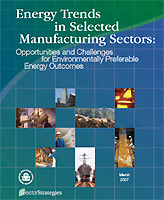ENERGY TRENDS IN SELECTED MANUFACTURING SECTORS: Opportunities and Challenges for Environmentally Preferable Energy Outcomes

Download Entire Report (PDF) (204 pp, 2MB, About PDF)
Note: EPA no longer updates this information, but it may be useful as a reference or resource.
On this page:
You will need Adobe Reader to view some of the files on this page. See EPA's PDF page to learn more.
Introduction
The US Environmental Protection Agency (EPA) invites you to learn more about the energy trends of certain industrial manufacturing sectors, including the opportunities and challenges for improved energy efficiency and clean energy use within these sectors. It is important to note that this report is an analytical document and does not convey Agency decision. The report's findings and policy options are based on the available data used in this analysis. EPA's Sector Strategies Division commissioned this analysis to meet the following objectives:
- Provide an overall understanding of current energy usage and expected future energy consumption trends within 12 manufacturing sectors;
- Assess where opportunities exist within these sectors to improve energy efficiency and use less emissions-intensive energy sources;
- Identify barriers to achieving improved environmental performance with respect to sector energy use; and
- Propose policy options to address regulatory barriers to improved performance.
For the purposes of this report "Environmentally Preferable Energy Outcomes" are achieved by reductions in energy-related air emissions through increased energy efficiency (which reduces fuel consumption and associated emissions) and/or transitioning to less emissions-intensive energy sources.
- The analysis focuses primarily on criteria air pollutants but it also includes some projections of carbon dioxide emissions. Other air emissions, such as air toxics, as well as water and land impacts are not included.
- The report indicates the amount of purchased electricity used by each sector, but the energy related emissions discussed in this report refer only to onsite emissions at industrial facilities.
- The analysis focuses on fuel inputs for energy use only and does not address feedstock fuel use (i.e., fuel raw material inputs to the manufacturing process).
Assessing energy usage trends and associated air emission impacts, as well as the viability of specific energy efficiency and clean energy opportunities, the report envisions environmentally preferable outcomes. Identifying ways in which regulations and other barriers inhibit improved energy efficiency and clean energy investment, the report suggests policy options EPA could pursue to promote environmentally preferable energy outcomes.
Sectors
The report details energy consumption trends and related air emissions from the following sectors, which together represent 85% of the industrial energy use in the United States:
- Aluminum
- Forest Products
- Motor Vehicles
- Cement
- Iron & Steel
- Motor Vehicle Parts
- Chemical
- Metal Casting
- Petroleum Refining
- Food
- Metal Finishing
- Shipbuilding
Key Opportunities
For each sector, the report provides "base case" and "best case" energy scenarios and identifies opportunities for reduced energy-related emission in five areas:
- Cleaner Fuels
- Combined Heat and Power
- Equipment Retrofit/Replacement
- Process Improvement
- Research and Development
Barriers
The report identifies and analyzes four main barriers to implementing the key opportunities, providing specific sector examples of where these barriers inhibit progress:
- Financial
- Technical
- Institutional
- Regulatory
Policy Options
The report suggests five policy options to promote discussion on ways to overcome identified regulatory barriers:
- Develop and promote broader application of regulations that recognize the emissions reductions resulting from increased energy efficiency
- Increase procedural flexibility to promote environmentally-preferable energy use
- Promote broader consideration of energy implications of rulemakings
- Promote the development of more favorable market conditions for energy efficiency and clean energy technologies
- Provide additional incentives and assistance through a sector-based approach
Download Report
You can download individual sector chapters, or the full report below.
Entire Report (PDF) (204 pp, 2MB , About PDF)
![[logo] US EPA](../gif/logo_epaseal.gif)